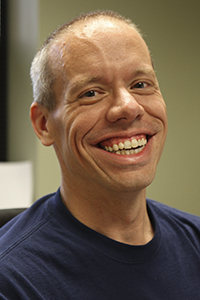Coming out easier in today’s society but still always a struggle
October 7, 2012
Vince Quevedo was raised in a conservative Catholic household in southern Illinois where the idea of homosexuality was deviant.
“My dad doesn’t believe in gay people; he thinks we’re all going through a phase and that I just haven’t met the right one,” Quevedo said. “So now, he’s 80 years old, I’m not going to argue with him. I just say, ‘Dad, I’m looking. I’m still looking.’ It is what it is.”
He said when he came out to his family, it made them question their views on homosexuality and accept not only him but also the LGBT community.
Quevedo said he was 24 years old when he met someone with whom he had a four-year relationship. He didn’t tell his family he was dating another male, however, until his sister asked him if he was gay.
“I thought, you know, how brave for someone to ask,” Quevedo said. “If she’s brave enough to ask, I should be brave enough to come out. So I did.”
Quevedo, associate professor of fashion design, said it is easier for people to come out in today’s society than it was 30 years ago when he was in college.
Coming out is more culturally accepted because people are more knowledgeable about the LGBTQ community, said Laurie Wagner, co-coordinator of the LGBT studies program. Wagner said even though people are less fearful about sexual orientation, society still has a long way to go for total acceptance.
“I think we’ve gotten better with the L [lesbian] and G [gay] and maybe the B [bisexual],” Wagner said. “But with the T [transgender] and Q [queer] and the AIO folks — I don’t think we’ve gotten there at all. I think maybe they’re the next wave of the movement. The institutionalization of homophobia, I think, still makes it a difficult personal choice.”
Roxie Patton, program coordinator for the LGBTQ center, said the success of a person’s coming out depends on their background: where they grew up, their family’s religious views and their cultural values.
“A lot of different things can confound your experience,” Patton said. “Each person’s coming out story is their own personal story, and you’ll never find two people who have the exact same story because you never know how the people around you will react.”
Patton said families may be more accepting today, but there is still a percentage of the LGBTQ population that is homeless or suicidal because the people around them do not accept their sexual orientation. She said 30 percent of teenage suicide victims are LGBT and 40 percent of homeless youth have been kicked out of their homes for their sexual orientation or gender identity.
Wagner said people who want to come out should by practicing with opening up to strangers to gauge their reaction and practice the language. Wayne Elliott, academic adviser for the Honors College, said telling strangers helped with his coming out experience.
“It’s an interesting thing that happened where I told someone that I didn’t know first,” said Elliott, who came out to his friend at Ohio State. “As time progressed, and he didn’t react poorly and some of our other mutual acquaintances didn’t react poorly, I started to talk to people I considered friends. It was like strangers first, then friends, then after a time period, family.”
Elliott said his family reacted negatively when he first told them he was gay and his sexual orientation is still a “tension-filled” subject. He said most of his friends from home were supportive and, the ones who weren’t, he cut out of his life.
“You can’t change other people,” Elliott said. “We can only change ourselves. I was comfortable being me, and I had to surround myself with people who were supportive. We can encourage each other, but that’s a losing battle to try to convince someone who believes you are evil or sinful or bad. It’s easier to move forward.”
Elliott said he believes coming out has changed since the 1990s at Ohio State — there is a linkage in social media where if a person comes out, everybody knows. On the other hand, he said it’s easier for students because they can look up to people in the media who have come out as role models for the LGBT community.
Quevedo agreed with Elliott that students who want to come out should have a strong support system. Like Elliott, he said his coming out experience was a gradual acceptance of himself.
“When I was a little kid, I was always really small and petite, people would make fun of me because I was Asian or because they thought I was gay,” he said. “They threw names at me. You queer, you faggot. Nowadays, if someone says that to me — well, first of all, I ignore it. I don’t have any tolerance for that kind of behavior. I just tune it out, I don’t know if it’s good or bad. I just don’t have time.”
Contact Madeleine Winer at [email protected].

























